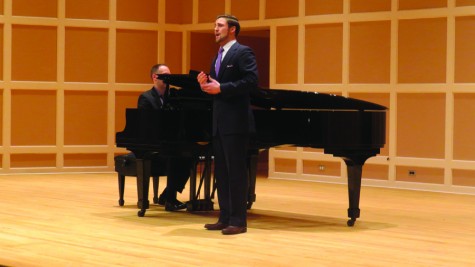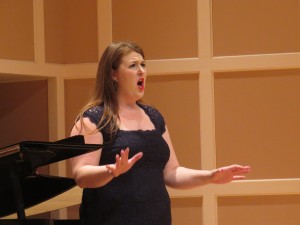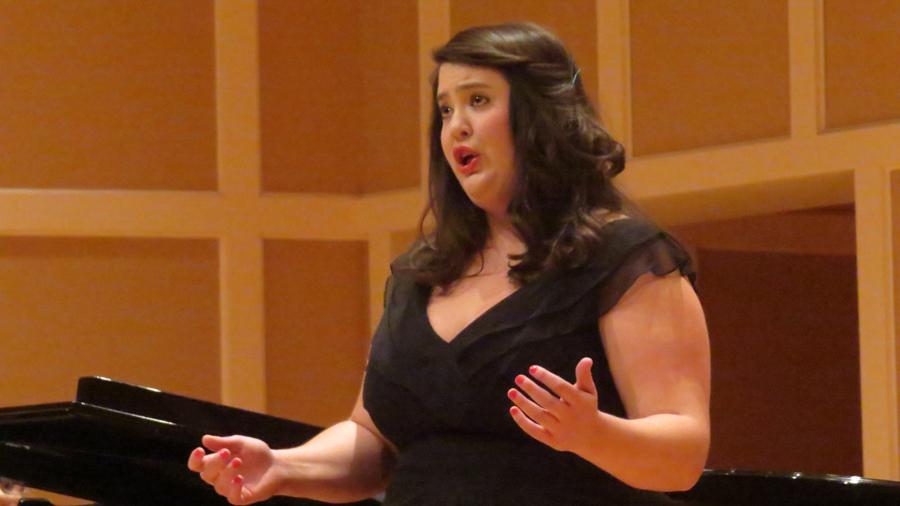Metropolitan Opera holds auditions in Sundin Hall
Aspiring singers get their shot at stardom.
Soprano Ashley Mispagel, who was one of five singers chosen to advance to the Region-level auditions, wows the judges with her performance of Bellini’s “Ah! non credea mirarti” from “La Sonnambula.”
November 26, 2014
Can you Handel it? Last weekend Sundin Hall played host to 22 up-and-coming singers who participated in the district level of the Metropolitan Opera National Council Auditions. Open to the public, these auditions give young singers between the ages of 20 and 30 the chance to advance to the next round with the possibility of going on to the Met in NYC. There are 41 Districts throughout the U.S., Canada and Puerto Rico.
The auditions began at Northrop Auditorium at the U of M, but have shifted around from year to year to include locations such as Ted Mann Concert Hall and the Ordway. However, following a change in personnel on the volunteer committee in charge of arranging the auditions, Sundin was selected as the new space.
“There is something really intimidating about going to District at the Ordway, because you’re on a big stage,” said District Finance Chair Jimmy Longoria. “Coming to a university, in a small, very warm and friendly hall is more accessible. So what we’re hoping is that we’ll increase the number of Minnesota singers that come here and participate.”

Baritone Charles Eaton auditions with “O vin, dissipe la tristesse” from Thomas’ “Hamlet” on the Sundin stage.
District Director for the auditions Connie Fullmer was encouraged by her father to volunteer for the Met when she was growing up, and she has been helping coordinate the auditions ever since. She and her father both studied at Hamline. Remembering the unique space of Sundin Hall, Fullmer proposed it to the committee as a potential space for the auditions to be held this year.
“When you walk in the front door, it feels warm; it feels inviting,” she said. “It has everything we need.”
Fullmer credited Director of Sundin Hall Silvester Vicic in helping the process come together. “Silvester totally gets it. He gets our mission and he knows the hall so well; he knows the sweet spots on the stage,” she said.
One of the most important aspects of coordinating the auditions is encouraging volunteer involvement, Fullmer said, particularly from young singers and students in the Hamline community. A team of 12 student volunteers signed up to serve as ushers, backstage guides, and judge’s guides.
First-year Zac Tambornino was hired as a stage manager/emcee for the event, and was responsible for managing the backstage team and coordinating breaks with the judges, as well as providing water and snacks for the singers as they prepared to go onstage. This student position was created by Fullmer and the committee. Fullmer, along with husband Longoria, runs a nonprofit called Mentoring Peace Through Art, which provides opportunities to help young people forward their career. Fullmer said that this was one of the ideas behind involving student volunteers like Tambornino so closely in the auditions.
“When he has to get a job and he has to stand and wait in line with 45 other people,the person reading his resume goes, ‘Stage manager for who?’ Then you’re in. You’re made,” Longoria said.
Prior to the auditions, Hamline hosted a workshop for students called “The Art of the Audition,” presented by renowned performer and Associate Director of the National Council Auditions Melissa Wegner. The workshop wasn’t just intended for Pipers with a musical bent; Wegner explained that the way you present yourself during an audition can easily be translated to job interview or workplace settings.
“There’s so many complementary skills involved with being a singer that you can use for the rest of your life,” she said.
According to her, the most important thing to learn from experiences like these is constant self-improvement.
“Of course you want your goal to be that you get into the company, or into the program, but as long as you learn something, I think it was successful,” she said. She suggested to auditioners and job applicants alike that they find a group of advisers, composed of teachers, coaches and peers, to give them the feedback that they need to improve.
“From the other side of the table, we [the judges] want you to do well,” Wegner said. “We’re not sitting back there trying to tear you apart. Anything that we tell you is to help you become a better singer.”
She emphasized the need for confidence. Using one of the biggest stage roles from Mozart’s “Le Nozze di Figaro” as an example, she said, “The judges don’t want to see you ask a question: ‘Am I Susanna?’ They want you to tell them: ‘I am Susanna.’” She explained that it is exactly the same in a job interview situation—the potential employers are looking for someone who is certain that he or she can fulfill a particular role.
However, in a high-pressure environment like the Metropolitan auditions, even the most prepared and most talented performers can suffer from nerves, which sometimes makes all the difference between whether they advance to the next level or not.
On Saturday, the decision was up to three musical professionals chosen from a list of possible judges provided by the Metropolitan Opera: Soprano Emily Pulley, baritone Robert Orth and vocal coach Jonathan Dudley comprised the experienced panel, who listened to two songs from each contestant—one chosen by the performer, and one by the judges from their listed repertoire.

The judges were given $7,500 in prize money to distribute to the performers as they saw fit. It was completely up to them to decide how many winners would move on to the next round, how many performers would receive “encouragement award” prizes and what the exact amount of each prize would be.
The auditions took several hours, and after reviewing 22 singers, five were selected to move on to the Regional auditions, and each received a prize of $1,200. Three more singers were given encouragement awards and prizes of $500 each.
One of the five winners was Cooper Nolan, a tenor in the Resident Artist Program at the MN Opera. Nolan offered his encouragement to singers who hope to audition in the future.
“Keep working,” he said. “Don’t let things keep you down. Let criticism build you. There’s no winning; it’s not like a football game. You can always keep improving with every audition. Trust your process.”
Given the success of the event, Fullmer hopes that Hamline will be able to partner with the Met auditions again in years to come. “It’s our dream to keep it in Sundin,” she said. She also hopes that further “Art of the Audition” workshops will continue to be a tool that students can use to help them prepare for opportunities in the real world.
The Upper Midwest Regional auditions will take place on Jan. 31 at the Ordway, and will include the winners from District competitions held in North Dakota, Iowa, Minnesota, Nebraska and Wisconsin. The first place winner (or winners) will get the opportunity to audition in NYC in March.
For more information about the Met auditions, visit www.metauditionsmn.org





